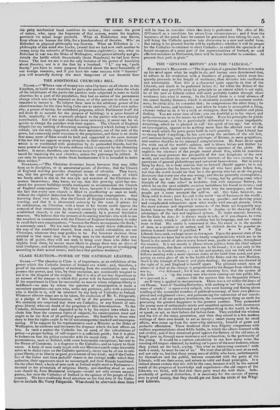THE ADDITIONAL CHURCHES BILL.
Gzoos.—" When a sum of money was raised by taxes on all classes in the kingdom, to build new churches for particular parishes, and when the whole of the inhabitants of the particular parishes were subjected to rates to build churches for a part of the population, they had no notice of the permanent charge which was to be imposed on them, or of the persons to whom it was intended to intrust it. To subject them now to the arbitrary power of the
churchwardens for the time being (who are to exercise, of their own autho- rity, a power of taxing, for undefined-purposes, which Parliament itself did not think fit to assume for the purpose of building) is a gross breach of
faith, implicitly, if not expressly pledged to the parties who have already contributed. But if the new churches were necessary, it never can be re- quisite to charge the parishes with their repairs. The Church of England chapels (to say nothing of dissenting meeting-houses) which belong to indi- viduals, are not only supported, with their ministers, out of the rent of the pews, but commonly yield- revenues to the proprietors, and there is no doubt that many more of them would be built and supported in the same manner if the law did not oppose so many obstacles to their erection—if the Church, which is so overloaded with protection by its pretended friends, had the same power of moving for its own defence which is enjoyed by the dissenting bodies. It never, therefore, can become necessary to cause parishes to be taxed for repairing the new churches, unless the patronage be jobbed. It can only be necessary to make thezn burthensome if it is intended to make them useless."
Srastearte.—"The Christian dissenters know, however they may differ front us in discipline, or in unessential points of doctrine, that the Church of England worship provides abundant means of salvation. They know, too, that the growing spirit of religion in the country, much of which we freely admit is due to the exagtple and exertion of the Christian dis- senters themselves; they know, we say, that this growing spirit has ren- dered the present buildings totally inadequate to accommodate the Church of England congregations. This they know, because it is demonstrated by the fact that every new church is filled M overflowing as soon as built, without the slightest deduction from the neighbouring congregations. And knowing these two facts, that the Church of England worship is a saving worship, and that it is obstructed serinu-ly by the want of places for its celebration, no Christian with a heart in his bosom could oppose the removal of that obstruction by the only means by which, in the case of an established church, it can be removed—namely, by a general legislative measure. We believe that the amount of dissenting teachers who wish to see the numbers in communion with the Church of England diminished, in order to swell their own congregations, "because the fleece accompanies the flock," is extremely smal We are sure that those who would throw difficulties in the way of the established church, from such a sordid calculation, are not Christians, whatever they may profess to be. For however desirous those entitled to that name may be to bring men to the standard of their own faith in all points, they will not seek to bring over those who differ but slightly from them, by means more likely to plunge them into an abyss of total irreligion ; and undoubtedly, depriving men of the power of worshipping according to their actual tenets, must have that perilous tendency."
























 Previous page
Previous page